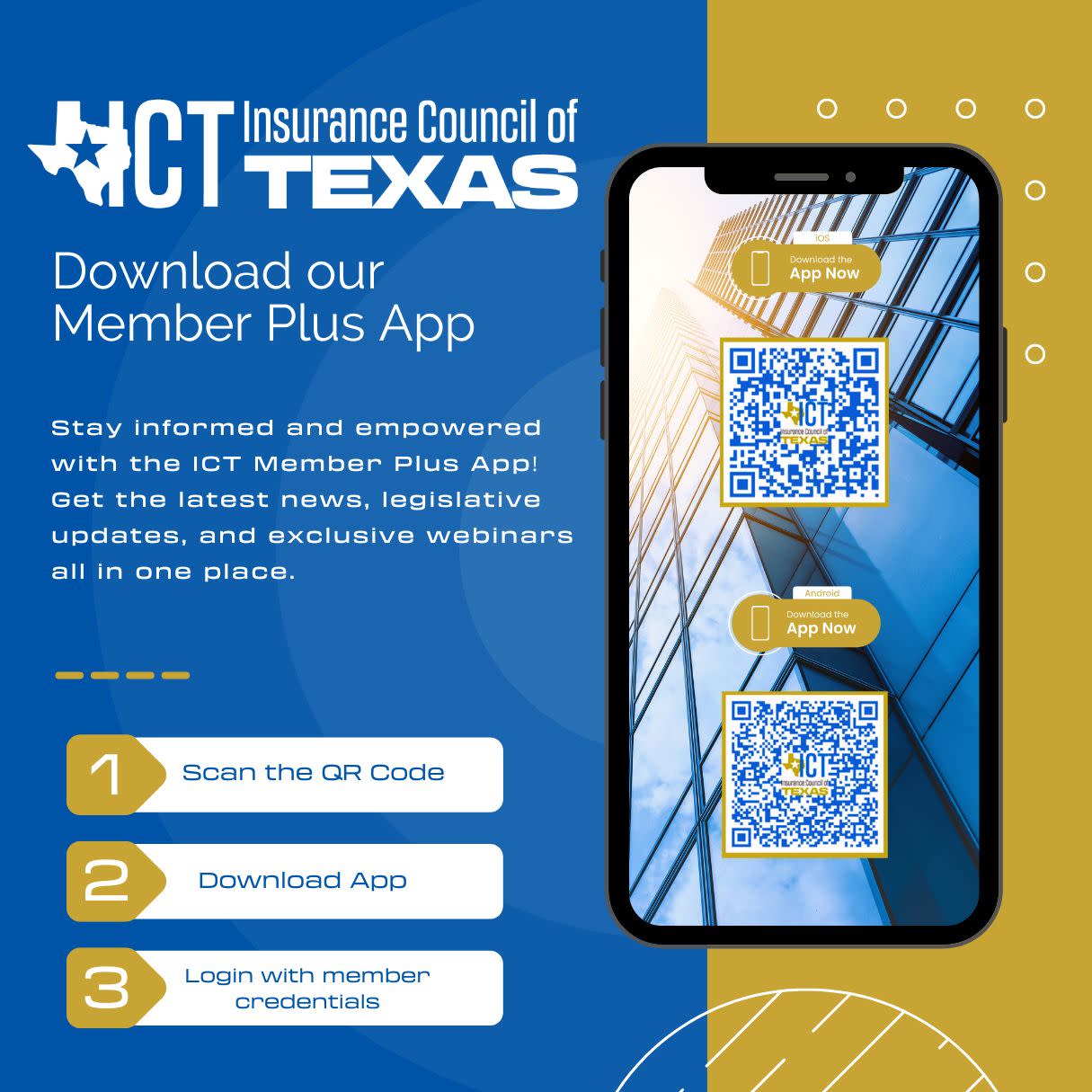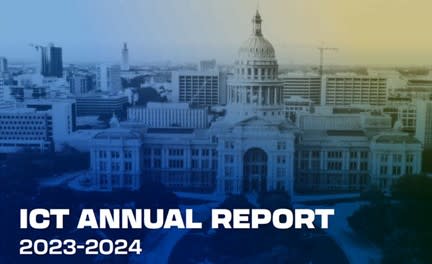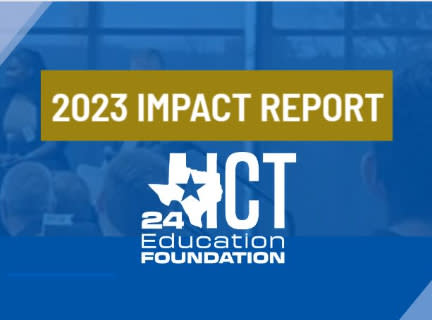News for the week of October 7, 2024
|
Jon Schnautz Joining ICT as Legal and Legislative Advocacy Counsel, Bringing Over 20 Years of Industry Expertise
|
The Insurance Council of Texas (ICT) is pleased to announce Jon Schnautz will be joining the ICT team as Legal and Legislative Advocacy Counsel beginning October 24. This new position will be part of our legislative lobbying services for our members, regulatory representation, and legal support for ICT’s mission. Jon brings over 20 years of legislative and legal experience in property and casualty insurance to this role and will work closely with ICT’s executive director, Albert Betts; Angie Cervantes, Manager of Government and Legislative Affairs; and Jay Thompson, ICT’s general counsel.
He has been a licensed attorney for over 15 years and is a graduate of the University of Texas Law School, with High Honors, and received his undergraduate degree from The University of Texas at Austin. He most recently served as Vice President of State Affairs for NAMIC and has previously served in policy and advisor roles with the Texas House Speaker’s office, served as Chief of Staff for the former chair of the House Insurance Committee, Rep. John Smithee, and policy analyst for former State Senator, Todd Staples.
We look forward to having Jon at ICT as he will enhance our legislative and insurance expertise in preparation for the 2025 legislative session.
|
ICT and USAA Join Local High School Safe Driving Event to Raise Awareness on Impaired and Distracted Driving
|
The Insurance Council of Texas (ICT) and USAA recently partnered with the Claudia Taylor Johnson High School PTSA Smart Driving Club for their annual safe driving event in San Antonio. As part of ICT’s "Survive the Drive Texas" campaign, the two organizations set up an interactive booth where students wore goggles simulating intoxication and performed sobriety tests. This hands-on experience highlighted how little alcohol it takes to impair driving abilities.
The event raised awareness about the dangers of distracted and impaired driving, reinforcing ICT and USAA's commitment to improving driving behaviors and promoting road safety across Texas. Other organizations in attendance included the Bexar County Sherriff's Department, The San Antonio police and fire departments, and TXDot.
for more information on ICT's Survive the Drive campaign, click here.
|
ICT Welcomes Shawnda Ewing as New Human Resources Manager
|
On September 16, the Insurance Council of Texas (ICT) welcomed Shawnda Ewing as its new Human Resources Manager. With over 20 years of experience in human resources, Shawnda has successfully implemented HR programs and policies in various leadership roles. She has worked with both small and large organizations, advising executive teams on HR strategies and ensuring compliance with state and federal employment laws.
Shawnda's strong organizational skills, attention to detail, and collaborative mindset will help ICT, and its subsidiaries manage change and ensure we have adaptable staff with the skills needed to meet our business objectives and strategic goals.
|
We want to Hear From You - Event Topic Survey
|
The Insurance Council of Texas (ICT) invites members to participate in a brief survey to help shape future events and webinars. Your feedback ensures we cover the subjects most relevant to you, and deliver them when you need them most. Share your insights and ideas to enhance upcoming ICT programming. Complete the survey today and influence our content!
Take Survey>>
|
Legislative News & Updates
|
Senate Committee Explores Property and Casualty Insurance Costs Affecting Texas Homeowners
|
Angie Cervantes, ICT Staff
|
The Senate Committee on Business & Commerce, chaired by Senator Charles Schwertner, met on October 1 to evaluate its interim charge regarding rising property and casualty insurance costs affecting Texas property owners, lenders, and development. Industry representatives from TCAIS, APCIA, and RAA were invited to provide testimony. A panel featuring Commissioner Cassie Brown and David Bolduc, Public Counsel at OPIC, opened the discussion by providing an overview of the Texas insurance market and the primary drivers of rate increases, highlighting that the Texas market is competitive and that businesses are eager to operate in Texas.
The committee discussed form freedom, with members raising concerns that allowing insurers to create non-standardized forms makes it harder for consumers to understand and compare policies. Some members suggested the need for legislation to revert to standardized forms to ensure "apples to apples" comparisons. Additionally, committee members questioned whether TDI's oversight of rate filings under the file-and-use system was adequate, raising the possibility of adding more standards for reviewing these filings to better protect consumers. At one point during the hearing, the suggestion of a three-commissioner board for TDI, including a consumer representative, was also proposed.
Homebuilders and mortgage bankers provided invited testimony on the impact of insurance on housing affordability, and concerns about a "widow penalty" were raised during public testimony.
ICT will continue to monitor interim activities and educate lawmakers about the benefits of Texas' move to file-and-use and form freedom, as well as the risks of reverting to prior approval and standardized forms.
|
ICT, APCIA, TCAIS Submit Letter to TDI Urging Careful Review of Rate Filing
|
Angie Cervantes, ICT Staff
|
On October 1, ICT in collaboration with APCIA and TCAIS, submitted a letter to TDI Commissioner Cassie Brown, urging her to carefully consider TWIA's actuarial analysis and the requirements of the Insurance Code for TWIA rates and rating standards.
As a reminder, on August 6, 2024, the TWIA Board voted 6-3 to file a 10% rate increase for residential and commercial risks. TWIA has since filed the proposed increase with TDI, which has until October 15 to approve, deny, or allow the rate to take effect on January 1, 2025.
|
TDI Adopts Updates to Contested Case Process
|
Angie Cervantes, ICT Staff
|
TDI adopted the repeal of 28 TAC §§1.47 - 1.49, 1.51, 1.52, 1.88, and 1.89; amendments to §1.32; and new §1.47 regarding the procedures for responding to notices of hearing, dispositions of contested cases, and appeals of dispositions. The repealed, amended, and new sections, which aim to modernize and clarify parts of TDI's contested case process, are adopted without changes to the proposed text.
The repeal of §§1.47 - 1.49, 1.51, and 1.52 removes regulations that no longer provide relevant guidance because of repealed or recodified statutes. The repeal of §1.88 and §1.89 removes regulations containing outdated procedures that have been superseded by regulations in 1 TAC Chapter 155. The adopted amendments to §1.32 and new §1.47 update the procedure for informing applicants and license or authorization holders about alleged violations, and informally disposing of contested cases when the applicant or license or authorization holder does not participate in the process.
The adoption order can be read here.
|
DWC Adopts Rule Correcting Duplicate Title
|
DWC adopted amendments to 28 TAC Section 147.10(Notification to the Division of Proposed Judgments and Settlements) to correct a duplicate section title. Section 147.10 will be renamed Commutation of Impairment Income Benefits to better describe its purpose.
|
DWC Revises Employer Forms
|
DWC has revised:
- DWC Form-002, Employer’s Report for Reimbursement of Voluntary Payment
DWC notes that the revisions were necessary to update the forms to conform to the agency's form standards and use of plain language and to remove outdated references. ICT submitted comments to DWC regarding proposed changes to DWC Draft DWC Form-001, Employer’s First Report of Injury or Illness; Draft Form-006, Supplemental Report of Injury based on member feedback to enhance the forms' clarity and usability. The form did not change from the draft version.
|
Registration Opening Soon
|
|
Florida's Biggest Insurer Cuts Over 600K Policies After Hurricane Helene
|
Florida’s Citizens Property Insurance Corporation will transfer over 600,000 policies to private insurers starting in late October due to increased demand. This move comes after private insurers dropped customers and raised rates, causing a surge in Citizens policies.
Key Facts:
- Citizens Property Insurance will transfer 413,808 policies in October and 235,035 in November to private insurers.
- Citizens currently has over 1.25 million policies, up from 420,366 in 2019.
- Florida residents face some of the highest home insurance premiums in the country, averaging $5,527 per year for a $300,000 home.
- The depopulation program helps match Citizens policyholders with private insurers.
- The move follows the devastation of Hurricane Helene, which resulted in over 84,400 insurance claims.
READ FULL STORY>>
|
|
Helene Loss Estimates: CoreLogic Sees $10.5B-$17.5B Insured Loss
|
Insured losses from Hurricane Helene have risen to an estimated $10.5 billion to $17.5 billion as more damages are assessed, with overall flood and wind losses ranging from $30.5 billion to $47.5 billion. AccuWeather's total damage and economic loss estimate has also surged, reaching between $225 billion and $250 billion.
Key Facts:
- Insured losses are now estimated at $10.5 to $17.5 billion, up from initial projections of $3 to $6 billion.
- CoreLogic’s revised estimate includes damage from wind, storm surge, and inland flooding across 16 states.
- AccuWeather projects total damage and economic losses between $225 billion and $250 billion.
- The storm brought severe winds and record-setting storm surge, causing widespread damage in Florida and inland states.
- Significant flooding occurred in North Carolina, South Carolina, and Georgia, with entire towns affected.
READ FULL STORY>>
|
P&C Industry News & Updates
|
Whistleblowers claim insurance companies shortchanged some Florida homeowners after Hurricane Ian
|
Florida homeowners impacted by Hurricane Ian claim insurance companies altered adjusters' reports to reduce payouts, leaving thousands in financial distress. Whistleblowers, including adjusters, testified about systemic fraud in which damage estimates were significantly lowered, affecting policyholders like the Rapkin family, whose $231,000 estimate was cut to just $15,000.
Key Facts:
- Hurricane Ian caused $113 billion in damages; some homeowners received drastically reduced insurance payouts.
- Adjusters report their damage estimates were altered without their consent, significantly lowering claims.
- The Rapkin family sued Heritage Insurance after receiving just $15,000 despite an initial estimate of over $231,000.
- Whistleblowers testified about widespread fraud, affecting multiple insurance carriers across several states.
- Florida has yet to make any arrests, despite evidence submitted by whistleblowers and ongoing investigations.
READ FULL STORY>>
|
|
‘It’s going to be a mess’: The flood insurance crisis following Helene’s wreckage
|
The aftermath of Hurricane Helene reveals a severe lack of flood insurance coverage in the Southeast, particularly in Georgia, North Carolina, and South Carolina, where many households are unprepared for flood damage. As climate change increases flood risks, the stark reality of inadequate insurance coverage exacerbates recovery challenges, especially for low-income communities.
Key Facts:
- Low Coverage Rates: In disaster-affected counties, only 0.5% of households in South Carolina and 0.8% in North Carolina have flood insurance through FEMA, highlighting a nationwide issue of inadequate flood protection.
- Financial Consequences: Without flood insurance, households face significant financial strain during recovery, often forced to rely on minimal FEMA aid and facing delays in receiving disaster funds from other sources.
- Inequality Post-Disaster: The lack of insurance exacerbates socioeconomic disparities, as low-income communities are less likely to purchase coverage and have fewer resources for rebuilding after disasters.
- Outdated FEMA Maps: The reliance on outdated FEMA flood maps leads many homeowners in high-risk areas to underestimate their flood risk and forgo insurance, contributing to the low uptake rates.
- Future Risks: As climate change increases the frequency and severity of flooding, experts stress the urgency of addressing these insurance gaps to prevent further financial and social disparities in recovery efforts.
READ FULL STORY>>
|
|
Florida Could Make Other States Pay for Its Insurance Crisis
|
Florida Congressman Jared Moskowitz is advocating for a "national catastrophic insurance fund" to alleviate the financial burden of home insurance claims from major storms, using federal bonds to spread risk and potentially reduce insurance premiums. While his proposed legislation aims to benefit high-risk states like Florida, it faces opposition regarding its impact on federal taxpayers and its failure to address underlying climate-related issues.
Key Facts:
- Legislative Proposal: Moskowitz's bill (HR 3525) aims to create a national catastrophic insurance fund funded by federal bonds, intended to reduce the financial impact of natural disasters on insurance companies and homeowners.
- Rising Premiums: Homeowners in Florida paid an average annual premium of $10,996 in 2023, significantly higher than the national average of $2,377, reflecting increased risks from natural disasters.
- Potential Cost Reductions: Analysis suggests that the proposed fund could lower annual premium growth by 25% in Florida and 12% nationally, making high-risk states more attractive to insurers.
- Concerns About Federal Burden: Critics, including the National Association of Mutual Insurance Companies, argue that transferring risk to the federal government could strain taxpayers and undermine incentives for building resilient properties.
- Lack of Climate Mitigation Measures: The proposal does not address essential climate damage mitigation strategies, which could be crucial for long-term sustainability in disaster-prone regions.
READ FULL STORY>>
|
Download the ICT Member Plus App!
|
ICT Reports & Publications
|
|


















